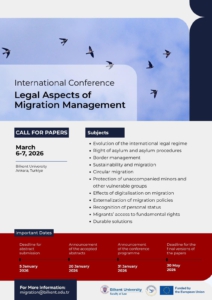Views
The Validity of the Utah Zoom Wedding in Lebanon, or the Question of Locus Celebrationis in the Digital Age

Many thanks to Karim Hammami for the tip-off
I. Introduction
Once in the 20th century, the so-called “Nevada Divorces” captured the attention of private international law scholars around the world, particularly regarding their recognition abroad. Today, a similar phenomenon is emerging with the so-called “Utah Zoom Wedding.” So, what exactly is this phenomenon? Read more
Rethinking Private International Law Through the Lens of Colonialism

Last week (7 June 2025), I had this extraordinary opportunity to give a presentation at the 138th Annual Conference of the Japanese Association of Private International Law, which took place at Seinan Gakuin Daigaku, Fukuoka – Japan. The theme of my presentation was “Private International Law and Colonialism.” In this talk, I shared some preliminary thoughts on a topic that is both extraordinarily rich and complex. The following note offers some initial reflections based on that presentation (with a few adjustments) with the aim of contributing to ongoing discussion and encouraging deeper reflection.
Under the Omnibus: Corporate Sustainability Due Diligence Directive’s rules on civil liability no longer overriding mandatory
The European Commission’s recent Omnibus proposes a significant change to the Corporate Sustainability Due Diligence Directive (CSDDD). Article 29(7) of the original CSDDD requires Member States to implement its rules on civil liability rules so that these rules apply as overriding mandatory provisions, if the law applicable to the claim is not a law of a Member State. The Omnibus package proposes to delete art. 29(7) CSDDD. As a result, Member States will no longer be obliged to implement CSDDD’s rules on liability as overriding mandatory provisions. Read more
News
Upcoming European Dialogue on Civil Procedural Law “Recent Developments on Brussels Ibis” Thursday, 4 December 2025 1 pm CET
The next session of the conference series European Dialogue on Civil Procedural Law will take place (online) on Thursday, 4 December 2025, from 13:00 to 17:00 (CET), under the theme “Recent Developments on Brussels Ibis”.
The event is organised by Dr. habil. Balázs Arató, PhD, Prof. Dr. Thomas Garber, Prof. Dr. Katharina Lugani and Prof. Dr. Matthias Neumayr.
The Brussels I bis Regulation, together with its parallel instrument, the Lugano Convention, forms the core of European civil procedure law. Events in this series serve to promote dialogue among Member States and with third countries, thereby strengthening and improving the integration and efficiency of European legal instruments. The interim online conference on 4 December 2025 will feature country reports from four legal systems and two presentations on current topics relating to the Brussels Ia Regulation. The event is aimed at academics and practitioners alike. We look forward to a lively exchange.
The speakers are :
- Dr. habil. Balázs Arató, PhD, Budapest, Hungary
- Dr. Caterina Benini, Università Cattolica del Sacro Cuore, Milan, Italy
- Assoc.-Prof. Dr. Eva Dobrovolná, Ph.D., LL.M., Masaryk University, Brno, Czech Republic
- Prof. Dr. Étienne Farnoux, University of Strasbourg, France, seconded to the Saint Joseph University of Beirut, Lebanon
- Prof. Dr. Thomas Garber, Johannes Kepler University Linz, Austria
- Prof. Dr. Katharina Lugani, Heinrich Heine University Düsseldorf, Germany
- Prof. Dr. Robert Magnus, University of Bayreuth, Germany
- Assoc.-Prof. Dr. Martina Melcher, M.Jur, University of Graz, Austria
- Prof. Dr. Matthias Neumayr, Johannes Kepler University Linz, Austria
- Prof. Dr. Anna Nylund, University of Bergen, Norway
The flyer for the event can be found here.
Please register here.
Participation is free of charge.
HCCH Monthly Update: November 2025
HCCH Monthly Update: November 2025
Conventions & Instruments
On 5 November 2025, Algeria deposited its instrument of accession to the 1961 Apostille Convention. With the ratification of Argentina, the Convention now has 58 Contracting Parties. With the accession of Algeria, the 1961 Apostille Convention now has 128 Contracting Parties. It will enter into force for Algeria on 9 July 2026. More information is available here.
On 27 November 2025, Monaco deposited its instrument of accession to the 2005 Choice of Court Convention. With the accession of Monaco, 38 States and the European Union are bound by the 2005 Choice of Court Convention. The Convention will enter into force for Monaco on 1 March 2026. More information is available here.
Call for Papers- International Conference on Legal Aspects of Migration Management
Bilkent University Faculty of Law and Jean Monnet Chair in Legal Aspects of Migration Management in the EU and in Türkiye cordially invite you to submit abstracts for the International Conference on Legal Aspects of Migration Management to be held at Bilkent University on 6-7 March 2026.
The Conference aims to give the opportunity to researchers who would like to present their theoretical or empirical research on the development of policy, legislative and administrative responses to key migration issues.
We particularly encourage submissions on the questions of evolution of the international legal regime relating to migration; the right of asylum and asylum procedures; border management; sustainability and migration; circular migration; protection of unaccompanied minors and other vulnerable groups; effects of digitalisation on migration; externalization of migration policies, recognition of personal status; migrants’ access to fundamental rights and durable solutions. Proposals involving comparative perspectives of international, European and national approaches are most welcome.
Abstracts (max. 500 words) (in English or in Turkish) should be sent to migration@bilkent.edu.tr by 5 January 2026.
Detailed information shall be provided upon request: migration@bilkent.edu.tr




